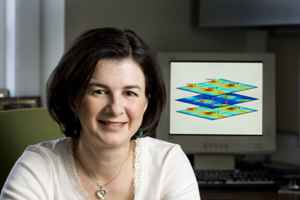INTERCONNECTS
Carnegie Mellon University's Diana Marculescu Receives Prestigious Computer Engineering Honor
Carnegie Mellon University's Diana Marculescu has been named a distinguished scientist for her significant impact on the computing field by the Association for Computing Machinery (ACM).
"This is a great honor for me from my peers as less than 10 percent of ACM members ever attain this accolade," said Marculescu, a professor of Electrical and Computer Engineering (ECE) at Carnegie Mellon.
A pioneer in energy-aware computing, Marculescu is developing novel power management techniques to improve the performance delivered per unit of energy consumed for computer hardware and software. Because of continuous downsizing of hundreds of processing cores on computer silicon chips, increased power consumption by these tiny processors creates major bottlenecks for increased performance.
Consumers and industry want smaller, faster systems, but the tradeoff is increased heat and decreased reliability on silicon chips, the powerhouse of all computing systems. Faster systems require more energy but more energy boosts operating costs.
"Our proposed power management techniques include the use of Voltage Frequency Islands (VFI) where we are able to guarantee a certain performance level with minimum power, even under decreased reliability or increased variation. Our new VFI-based design style enables fine grain power management for many-core systems, including both the hardware and software in computer systems. The proposed power management mechanism also will ultimately help cut energy costs," Marculescu said.
Ed Schlesinger, head of ECE, praised Marculescu for her drive and problem-solving research goals. "This is wonderful recognition for significant work that represents important aspects of the many efforts underway at CMU in the area of energy efficiency, management and use," Schlesinger said.
Marculescu received a degree in computer science from Politehnica University of Bucharest, Romania in 1991 and a Ph.D. in computer engineering from the University of Southern California in 1998. She was a recipient of the National Science Foundation Faculty Career Award in 2000 and Carnegie Institute of Technology George Tallman Ladd Research Award in 2004.
"This is a great honor for me from my peers as less than 10 percent of ACM members ever attain this accolade," said Marculescu, a professor of Electrical and Computer Engineering (ECE) at Carnegie Mellon.
A pioneer in energy-aware computing, Marculescu is developing novel power management techniques to improve the performance delivered per unit of energy consumed for computer hardware and software. Because of continuous downsizing of hundreds of processing cores on computer silicon chips, increased power consumption by these tiny processors creates major bottlenecks for increased performance.
Consumers and industry want smaller, faster systems, but the tradeoff is increased heat and decreased reliability on silicon chips, the powerhouse of all computing systems. Faster systems require more energy but more energy boosts operating costs.
"Our proposed power management techniques include the use of Voltage Frequency Islands (VFI) where we are able to guarantee a certain performance level with minimum power, even under decreased reliability or increased variation. Our new VFI-based design style enables fine grain power management for many-core systems, including both the hardware and software in computer systems. The proposed power management mechanism also will ultimately help cut energy costs," Marculescu said.
Ed Schlesinger, head of ECE, praised Marculescu for her drive and problem-solving research goals. "This is wonderful recognition for significant work that represents important aspects of the many efforts underway at CMU in the area of energy efficiency, management and use," Schlesinger said.
Marculescu received a degree in computer science from Politehnica University of Bucharest, Romania in 1991 and a Ph.D. in computer engineering from the University of Southern California in 1998. She was a recipient of the National Science Foundation Faculty Career Award in 2000 and Carnegie Institute of Technology George Tallman Ladd Research Award in 2004.

Like
Like
Happy
Love
Angry
Wow
Sad
Comments (0)


 How to resolve AdBlock issue?
How to resolve AdBlock issue?